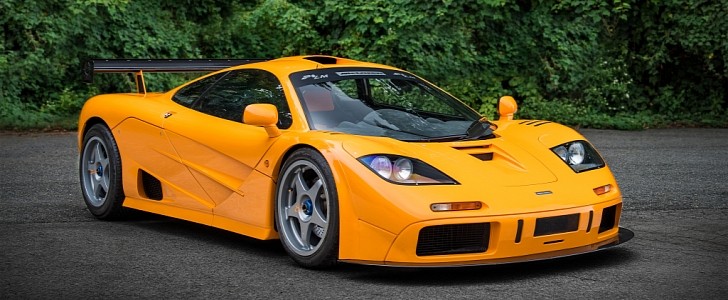Born as a 5 Series powered by an M1 engine, the BMW M5 has taken many forms since its introduction in 1984. It made the transition from inline-six to a V8 in 1998, and it was powered by a unique V10 engine from 2004 to 2010 before BMW reverted back to a V8. The latest-generation M5 is by far the most spectacular when it comes to performance, thanks to the addition of the CS badge, which enhances the 4.4-liter V8's output to a massive 627 horsepower.
BMW says the CS's engine is the most powerful it has ever developed, but that's not true. The most potent BMW engine dates back to the 1990s. But there's a catch: it was never offered in a BMW road car. If you're a BMW nut, you probably already know I'm talking about the S70/2, the 6.1-liter V12 engine that the Munich-based company developed for the McLaren F1.
This engine was commissioned by Gordon Murray after he was turned down by Honda, his first choice for firepower. Technically, the S70/2 in the F1 was based on the S70B56, the 5.6-liter V12 that BMW had introduced in the first-generation 8 Series in 1992. However, the S70/S only shared the V12 layout and bore spacing with the 850CSi.
Featuring heads based on the S50 inline-six engine, four valves per cylinder, variable valve timing, individual throttle bodies, and a dry-sump oiling system, the S70/2 was essentially a new design.
Tipping the scales at only 266 kg (586 pounds), the S70/2 was good for 618 horsepower and 479 pound-feet (649 Nm) of torque, both impressive figures for the era. But 618 horsepower is a bit below the BMW M5 CS' output of 627 horses, right? Well, the S70/2 was capable of more than that, and McLaren made full use of its immense power in a limited-edition version of the F1, the LM.
Built to celebrate McLaren's success at the 24 Hours of Le Mans, where the F1 won outright in 1995, the LM was fitted with the race-spec engine that had its race-mandated restrictors removed. This resulted in a higher output of 671 horsepower and 520 pound-feet (704 Nm) of torque. That's exactly 44 horses more than the BMW M5 CS.
Until BMW develops an even more powerful version of its current V8, assuming it will happen at some point, the S70/2 remains the most powerful engine ever to come out of the M division shop. Sure, it wasn't offered in a BMW, and the F1 LM was limited to only five units, which were sold for more than $1.5 million a pop, but it was a road-legal car without significant alterations under the hood.
BMW actually used the S70/2 in one of its cars, but only on the race track. A race-spec version of the F1 engine, called the S70/2, powered the V12 LM and V12 LMR racing prototypes that BMW fielded in various series from 1998 to 2000.
The V12 LMR brought BMW's first and only victory at the 24 Hours of Le Mans in 1999 as well as second-place finishes in the American Le Mans Series in 1999 and 2000.
BMW says the CS's engine is the most powerful it has ever developed, but that's not true. The most potent BMW engine dates back to the 1990s. But there's a catch: it was never offered in a BMW road car. If you're a BMW nut, you probably already know I'm talking about the S70/2, the 6.1-liter V12 engine that the Munich-based company developed for the McLaren F1.
This engine was commissioned by Gordon Murray after he was turned down by Honda, his first choice for firepower. Technically, the S70/2 in the F1 was based on the S70B56, the 5.6-liter V12 that BMW had introduced in the first-generation 8 Series in 1992. However, the S70/S only shared the V12 layout and bore spacing with the 850CSi.
Featuring heads based on the S50 inline-six engine, four valves per cylinder, variable valve timing, individual throttle bodies, and a dry-sump oiling system, the S70/2 was essentially a new design.
Tipping the scales at only 266 kg (586 pounds), the S70/2 was good for 618 horsepower and 479 pound-feet (649 Nm) of torque, both impressive figures for the era. But 618 horsepower is a bit below the BMW M5 CS' output of 627 horses, right? Well, the S70/2 was capable of more than that, and McLaren made full use of its immense power in a limited-edition version of the F1, the LM.
Built to celebrate McLaren's success at the 24 Hours of Le Mans, where the F1 won outright in 1995, the LM was fitted with the race-spec engine that had its race-mandated restrictors removed. This resulted in a higher output of 671 horsepower and 520 pound-feet (704 Nm) of torque. That's exactly 44 horses more than the BMW M5 CS.
Until BMW develops an even more powerful version of its current V8, assuming it will happen at some point, the S70/2 remains the most powerful engine ever to come out of the M division shop. Sure, it wasn't offered in a BMW, and the F1 LM was limited to only five units, which were sold for more than $1.5 million a pop, but it was a road-legal car without significant alterations under the hood.
BMW actually used the S70/2 in one of its cars, but only on the race track. A race-spec version of the F1 engine, called the S70/2, powered the V12 LM and V12 LMR racing prototypes that BMW fielded in various series from 1998 to 2000.
The V12 LMR brought BMW's first and only victory at the 24 Hours of Le Mans in 1999 as well as second-place finishes in the American Le Mans Series in 1999 and 2000.





























































































































































